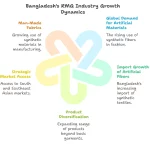These are tough times for Pakistan’s once-thriving textiles industry. The long-running energy crisis along with security concerns in a country plagued by militancy and political violence have taken a heavy toll. Now it faces a new threat: competition from Bangladesh. “Bangladesh also has energy problems but, unlike us, they are managing it and managing it well,” said Salamat, whose company, Tauseef Enterprises, has 3,000 employees in Pakistan. “The energy crisis has increased the cost of doing business in Pakistan.” Salamat’s company opened two units in Dhaka about three years ago, and it is now in the process of setting up a third. “Good business in Bangladesh has encouraged us to further expand our operations there. We are overbooked,” said Salamat, whose firm produces products for brands such as Adidas and Nike. At least five companies already have or will soon be setting up operations in Bangladesh. Masood Textile Mills, a large knitwear exporting company, is setting up a sewing plant in Bangladesh.
Bangladesh is making a strong play to lure Pakistani textile businesses to relocate or expand to Dhaka. It has more investor-friendly policies, cheaper skilled labour and, crucially, ready access to 37 countries, including the European Union, Canada and Australia. Pakistan, on the other hand, faces higher tariffs in the EU and U.S. markets, putting its exports at a disadvantage. The movement of textile business from Pakistan to Bangladesh is also evidence of an emerging trend in labour and capital movement in a globalising world.
Pakistan’s textile industry accounts for 38 percent of workers in the manufacturing sector and over half of its exports, which stood at nearly $25 billion (15.3 billion pounds) in fiscal 2010/11. Textile exports rose 35 percent to $13.80 billion in 2010/11, but that was mainly because of high cotton prices which are expected to come off. Indeed, exports fell by about 15 percent in July, the first month of the 2011/12 fiscal year.
“They are trying to come to our country because investment in Pakistan is too risky,” according to Bangladesh officials. Foreign buyers are reluctant to place orders in Pakistan due to security concerns. The energy crisis in Pakistan is also a major hindrance. “Work in factories is closed for three days a week due to gas load-shedding, because of which the industry is working at 30-40 percent of its capacity,” said Wasim Latif, chairman of the Pakistan Textile Exporters Association. Bangladesh is also facing up to 2,000 MW of shortages because of a gas supply crisis but it is taking steps to address the energy shortage. As many as 89 power plants are in pipeline on a fast-track basis to triple power generation to 15,000 MW over the next five years.
Bangladesh last year nearly doubled the minimum monthly wage for millions of workers in the garment industry to 3,000 taka (25 pounds), but pay is still low compared with those of competitors in China, India, Vietnam, Thailand and Cambodia. Pakistan’s minimum wage is much higher, at a government-set 7,000 rupees (49 pounds), and some factories pay even more, says Latif from the Pakistan Textile Exporters Association. Low labour costs have helped Bangladesh join the global supply chain for low-end textiles and clothing, manufacturing garments for international brands such as JC Penney, Wal-Mart, H&M, Kohl’s, Marks & Spencer and Carrefour.
Bangladesh is also offering tax holidays of up to 10 years to foreign investors, as well as duty-free import of raw materials and repatriation of capital and profits. “Obviously, the investment climate in Bangladesh is better due to attractive incentive packages earmarked for foreign investors, a better political climate, relative social stability, and a promise to ensure required infrastructures including electricity, said Mujeri, a senior economist.





